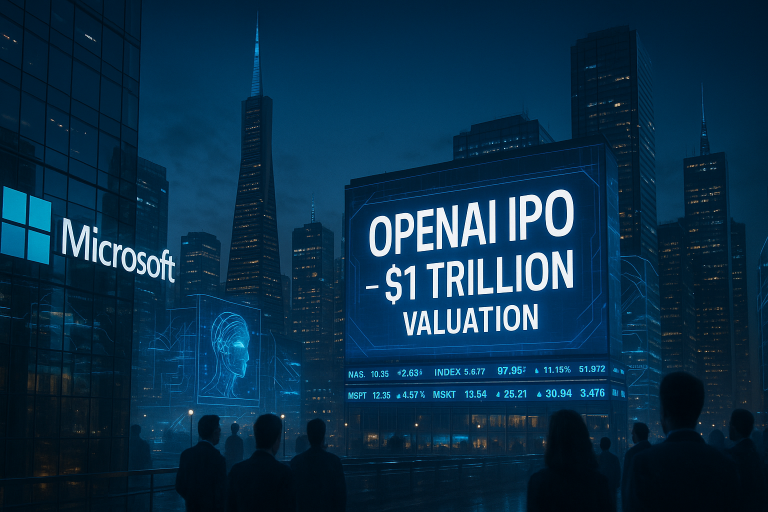OpenAI is laying the groundwork for a potential initial public offering that could value the company at around $1 trillion, according to recent reports from Reuters.
The ChatGPT maker is considering filing with securities regulators as soon as the second half of 2026, with a possible listing in 2027, and has discussed raising at least $60 billion in what would rank among the largest public offerings in tech history.
This follows OpenAI’s recent corporate restructuring, in which the company transformed into a public benefit corporation while finalizing a new agreement with Microsoft, its largest investor.
OpenAI IPO: A trillion-dollar question for Microsoft
For Microsoft, the stakes couldn’t be higher.
Following OpenAI’s recent restructuring, the tech giant now holds a 27% stake in OpenAI Group PBC, valued at roughly $135 billion, down from an earlier 32.5% before new funding rounds diluted its position.
Since first investing in 2019, Microsoft has poured more than $13 billion into OpenAI, weaving its GPT technology throughout its ecosystem, from Office 365 and Windows to its Azure cloud platform.
A public listing could dramatically reshape the value of that investment.
At a $1 trillion OpenAI valuation, Microsoft’s stake would be worth about $270 billion on paper, nearly double its current book value.
That would mark one of the most lucrative corporate venture bets ever made, eclipsing even Google’s early acquisition of YouTube or Facebook’s purchase of Instagram.
But alongside the upside come new risks.
Microsoft currently enjoys exclusive rights to OpenAI’s intellectual property until 2032, along with a revenue-sharing agreement that gives it around 20% of OpenAI’s top line until the company reaches what it calls artificial general intelligence.
That arrangement, however, may not last.
OpenAI has already indicated plans to reduce partner revenue shares from just under 20% today to about 8% by 2030, a move that could keep an extra $50 billion in OpenAI’s own coffers while limiting Microsoft’s future returns.
And once OpenAI goes public, those tensions could sharpen.
A new base of shareholders, focused on profitability and independence, would likely pressure the company to renegotiate its long-term agreements, or even to forge fresh partnerships with other cloud players like Google or Amazon.
For Microsoft, that would mean navigating a more crowded, more competitive AI landscape, one where its biggest investment could also become its biggest rival.
How a public OpenAI could reshape the AI market
If OpenAI were to list publicly at a $1 trillion valuation, it would instantly join the world’s most exclusive corporate club, rubbing shoulders with giants like Nvidia, Microsoft, Apple, Alphabet, Amazon, and Meta.
That would make it not just a headline-grabber, but one of the ten most valuable companies on the planet.
For perspective, recent secondary-market trades have pegged OpenAI’s value at roughly $500 billion, already enough to crown it the most valuable venture-backed startup in history.
A move to public markets could double that figure, and in doing so, send ripples across the entire AI sector.
Such a debut would almost certainly spark a wave of follow-on listings.
Rivals like Anthropic, xAI, and Cohere are already drawing intense investor attention. Anthropic, the maker of Claude, recently raised $13 billion at a $183 billion valuation.
If OpenAI goes first and succeeds, its share sale could set the benchmark for how the public markets value generative AI firms, determining both investor appetite and how far the current AI boom can really run.
The post What would a $1T OpenAI IPO mean for Microsoft, investors and the AI market appeared first on Invezz

